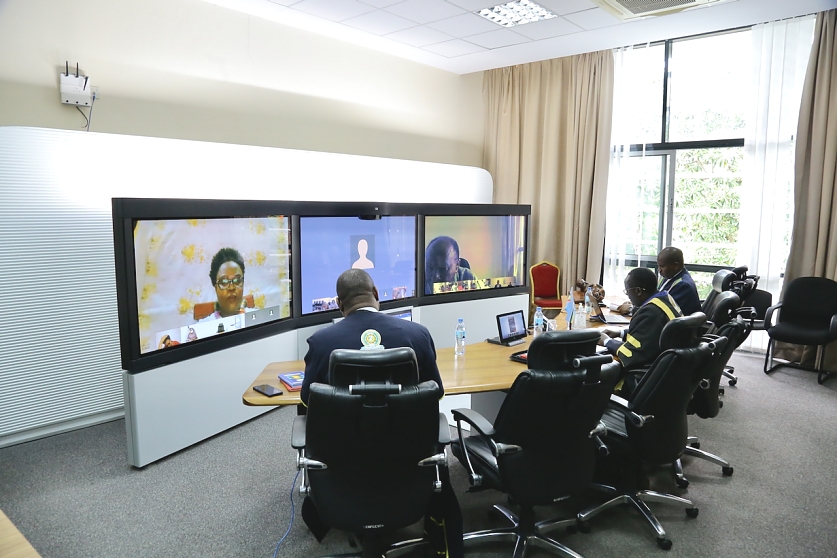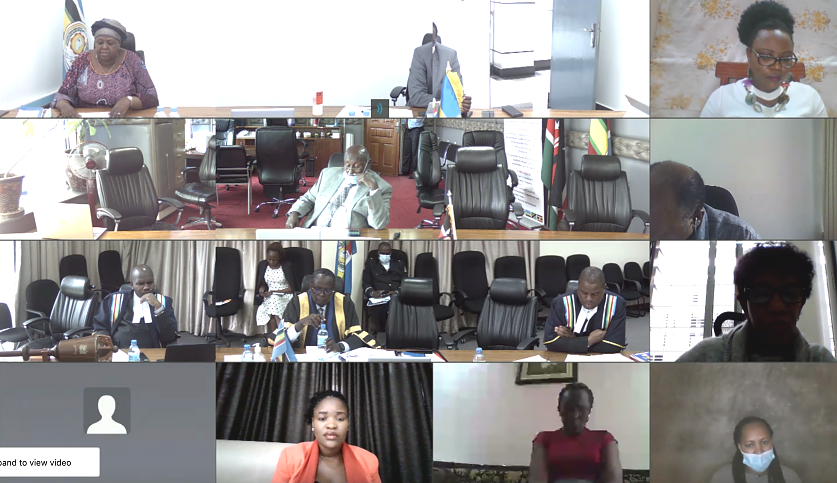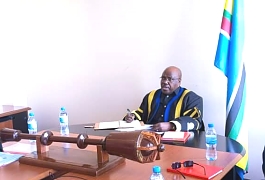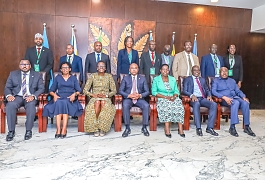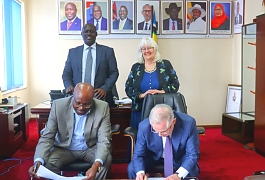… calls for strong political will, commitment and people led processes
East African Legislative Assembly, Arusha, 11th February, 2021: The East African Legislative Assembly is rooting for political integration of the EAC. In so doing, the Assembly has reiterated the need to adhere to a triad-approach encompassing; a common foreign policy, peace and security and good governance.
Further on, for the legitimacy and sustainability of political integration to be realized, EALA wants a positive environment characterized by among other factors, a strong political will, commitment to integration agenda, people-led processes and the existence of viable regional structures.
A report of the regional Assembly on “the progress made by the community towards achieving the EAC Confederation and the EAC Elections Observer Missions”, adopted on February 10th, 2021, echoed a robust constitutional making exercise which ensures a comprehensive consultative process with clear benchmarks for a model Political Confederation. The report further elucidates the manifestation of citizens’ political will through the holding of regular, free and fair elections.
The Chairperson of the Committee on Regional Affairs and Conflict Resolution, Hon. Amb. Ndangiza Fatuma, presented the report to the House, following an oversight activity, held in the region in November-December 2020. The Regional Affairs Committee, held a virtual activity and interacted with EAC Department of Political Affairs on the subject matter. The activity among others, sought to assess progress made in the attainment of the Political Federation as the fourth pillar of the integration process, assess progress with regards to drafting of the EAC Constitution to anchor the Political Federation, as well as identify existing gaps.
Hon. Ndangiza, cites fundamental tenets crucial to enable realization of the Political Confederation as; inter alia, allowing entities participating in the Confederation (Partner States) to retain their sovereignty. The Constituent States are further guaranteed the freedom to join and withdraw from the Confederation. The Confederation has the right to suspend and/or expel a Constituent State that violates specified aspects of the Federal Constitution. It states further, that, operations of the Confederal Government depend greatly on the good will of the Constituent State’ governments.
“The decision-making at the confederal level is based on consensus and/or unanimity,” Hon. Ndangiza said.
The report cites the principle of good governance is one of the fundamental and operational principles of the Community. This principle is provided for under Article 6 and 7 of the EAC Treaty. On this score, the Assembly urges Council of Ministers to expedite the finalization of the said EAC Protocol on Good Governance, to enhance harmonization of the democratic governance policies, practices, laws and standards.
On the four pillars of integration, the House was informed that considerable progress has been registered in the first three (3) pillars of integration (Customs Union, Common Market and the Monetary Union). The Chairperson informed the House that on the fourth pillar (Political Federation), there appeared to be a diversion with the region instead, taking the route of the Political Confederation.
“Even with this diversion, the process has been slow and riddled with enormous challenges and if not properly addressed, will delay the achievement of this milestone”, Hon. Ndangiza told an attentive House.
“The Council of Ministers needs to fast-track public consultations on Political Confederation and ensure diverse participation of key stakeholders”, Hon Ndangiza affirmed.
The House was informed about delays in implementation of the roadmap of the constitutional making process and the various challenges encountered. The dreaded Coronavirus (COVID 19) pandemic, also countered for negative impact, necessitating need to revise the roadmap and methodology of the process.
“Just like any other EAC process or programs, the constitutional making has been affected by Covid19. The pandemic has not only limited the movements of constitutional experts, but it has also affected the agreed and projected timelines which have resulted in delayed realization of the constitutional making process”, Hon Amb Ndangiza said.
“The associated challenges brought about by COVID 19 notwithstanding, EAC should be proactive and embrace opportunities provided by digital technology to revitalize public consultation and guarantee that the process proceeds”, the Member noted.
“This will entail revising the roadmap of drafting a model political confederation and adoption of new and relevant methodologies in view of the Coronavirus pandemic,” the Chair added.
Other challenges Hon Ndangiza noted, include the lack of a fully-fledged secretariat to facilitate the constitutional experts as well as fears and concerns raised by East Africans towards fast-tracking the Political Federation.
Hon. Ndangiza lamented over the low involvement of EALA in the constitutional process.
“Up until the Committee interacted with the department of Political Federation, there had been no involvement of EALA or the Committee of Regional Affairs in the processes of formulating the Constitution of East Africa. The lack of EALA’s participation does not only deny EALA as a people’s representative, the opportunity to contribute to the process, but it also undermines EALA’s statutory mandate of oversight of the integration process,” Hon. Ndangiza said.
“There is need for EAC Council of Ministers to enhance the role of the Assembly and the Committee of Regional Affairs and Conflict Resolution in the Constitution making process. The move aims at allowing the Legislative organ to exercise its oversight and representative mandate,” Hon. Ndangiza further added.
On democracy in the region, EALA observed that conducting periodic and regular elections contributes to the promotion of a democratic culture.
“Elections, if transparently conducted, promote and inculcate democratic values in election processes and gives the democratic exercise the legitimacy, acceptability and consolidation of good governance in the respective Partner States”, the House was informed. The House was apprised of the need to observe all elections in all 3 phases of its cycle (the election cycle). This includes the pre-election period, during elections, post-election period, counting and release of results, in order to be confident to report whether the elections were credible, free and fair.
At debate, Hon. Dr. Abdulla H. Makame said the Assembly has been placed on the periphery when it comes to oversight of the electoral processes. I would like to state that reports of the observations of elections should not only be laid on the table – but be further debated,” he said.
"It is further in the interest of the Community for the Protocol on Good Governance to be finalized”, the legislator said.
On her part, Hon. Mary Mugyenyi, said the Assembly needs to meet with the Committee of Constitutional Experts charged with drafting of the EAC Constitution. “We need to be apprised so we can sensitize citizens. It is also important to have the annual State of EAC Address by the Chair of Summit of EAC Heads of State, where impetus and direction can be given on the matter of the Political Federation,” she added.
Hon. Adan Noor said the appointment of Head of Election of the Observation Mission should be a preserve for the Council of Ministers or even the EAC Summit. “Better funding is also necessary every financial year to grow the fund-base before a new mechanism is sought”, he said.
Hon. Francoise Umuwukiza said there was need to enhance capacity building of election observers saying proper planning towards all stages of elections’ observation were fundamental.
Other Members who supported the debate included Hon. Maryam Ussi, Hon. Paul Musamali, Hon. Adam Kimbisa, Hon. Eng. Mohammed Mnyaa and Hon. Fancy Haji.
The Chair of the Council of Ministers, Hon. Nshuti Manasseh supported the report and remarked it was time for the principle of consensus to be revisited in future to enhance value addition at the Community.
For more information, please contact:
Mr Charles Kadonya
Acting Clerk, East African Legislative Assembly
Tel: +255-27-2508240 Fax: +255-27-2503103
Cell: +255-765-850513
Email: CKadonya@eachq.org
Web: https://www.eala.org

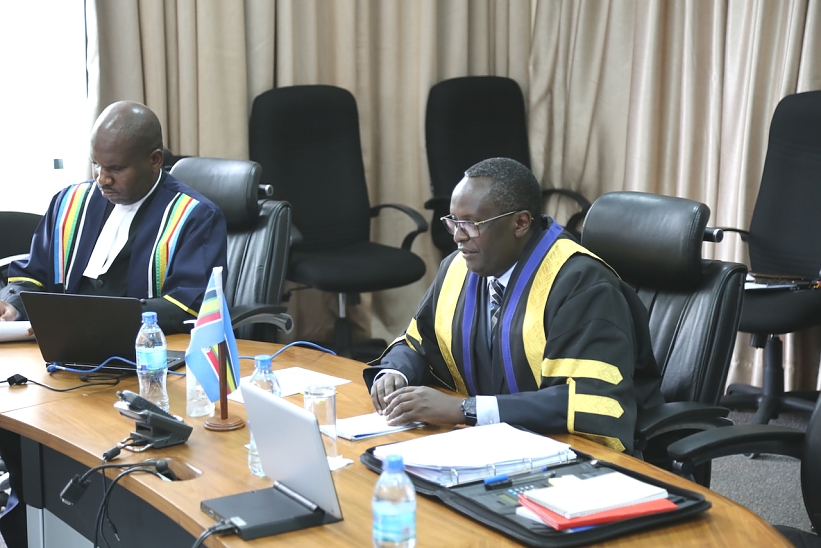
_837_748shar-50brig-20.png)
